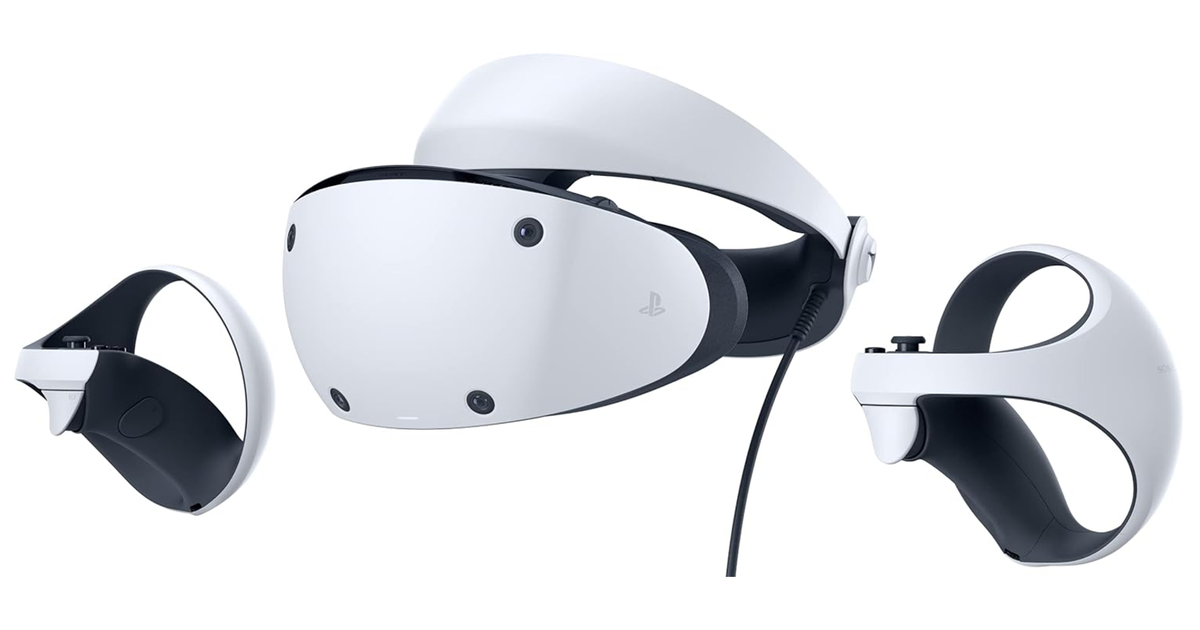There just aren’t enough engaging VR titles, everything still feels like a tech demo.
the entire vr space is a solution waiting for a problem. gaming seems the only practical application and it just cant turn out anything to trigger mass adoption.
Honestly I feel 3D video production is a huge missed opportunity. I don’t mean YT videos played in a VR screen, but actual 360-captured videos specifically designed for VR. Would probably work for MVs.
The ability to control where the audience is looking is pretty significant in produced videos. Not only does it ensure (or makes more likely) they see what you want them to see, it also means they won’t see what you don’t want them to see, like the crew of people doing support tasks in various places out of frame. The limited field of view makes production significantly easier.
More expensive to produce, with a much smaller target market.
PlayStation should partner with Pornhub and make some PSVR2 content.
Since they are japanese based make that JAV or hentai.
Prices remain obscene because every idiot thinks “it needs more pixels!” when that has literally never been a limiting factor. One-millisecond head-tracking latency on a 480p watch-TV-on-a-plane HMD would beat an 8K-per-eye Pimax gizmo in 3DOF.
And every manufacturer imagines owning the entire tiny-ass market, so compatibility is worse than 1980s CP/M machines.
And you still need a monster computer or Wii graphics to run at a do-or-die 120 Hz or whatever. Which is a problem the industry won’t even acknowledge. If your monitor relied on software to hit its refresh rate it would blink and flicker constantly. VR frame drops make the whole world lag.
$500 for an accessory that’ll only work on a dozen games for your $600 console is not a serious business model.
There’s one company doing it right, but it’s Facebook, so fuck them.
Eh, I think comfort is a big factor as well. Having something strapped to your face for hours at a time is just never going to be something most people do unless there is a really compelling reason for it. Right now, there just isn’t. You can already watch TV on an airplane just fine. The games are cool, but there’s just nothing “can’t miss” out there yet. That’s probably why porn is really the biggest hit with VR, because it does offer a new experience, and it is naturally consumed in short bursts
Definitely also a factor, but one generally addressed incidentally when slashing costs. Weight is expensive.
Smaller tech also keeps getting developed and then ignored. Nvidia had a fascinating lightfield setup ten fucking years ago that suddenly went nowhere.
Here is an alternative Piped link(s):
Piped is a privacy-respecting open-source alternative frontend to YouTube.
I’m open-source; check me out at GitHub.
You lost me when you mistook valve for Facebook.
The Index is overpriced by itself and relies on equally-overpriced external hardware for tracking. The controllers are nice, but again, hideously expensive. It’s an excellent choice for people already committed to doing VR on their gaming PC. That is not a lot of people.
Inside-out and standalone is the right answer. Inside-out, standalone, and cheap. And not attached to Mark Zuckerberg.
Personally, buying an index for me did not feel overpriced, and I’m barely a thousandaire. I’d tried the existing crop of standalone hardware (for accuracy’s sake, this is circa 2020). Those, relative to their performance, felt overpriced. I feel that got what I wanted, for a price I felt was fair. The build quality is up to my expectations. Fully acknowledge this is niche, but the value proposition didn’t make me gasface.
When computing power is 10-20x better, cooler, more efficient and smaller, I’ll order from that menu, and you nailed it with the exclusion of Zuckerberg. He’s done more to cringe-ify VR than any google glasshole ever could, even if we ignore the creepy idea that I’m a “product” to them while using occulus…
Relative is not what keeps this niche.
there’s also people like me that got absolutely burned with the failure that was the psvr 1 and I refuse to even concider getting another. I used the first one maybe twice but it’s specs were so trash that it made me sick trying to play it. I don’t have this issue with my index.
My theory has always been that the better you try and make VR, the more it’s going to negatively affect the general population.
The same thing happens when you try to make life like prosthetics. If you make a prosthetic that’s too visually similar to the original, your brain actually tries to communicate with it, and when it doesn’t get anything back, it can cause symptoms of dysmorphia.
I think similar things are happening with VR, that the more sound and visuals are able to trick your brain, the more it will conflict with proprioceptors telling you that you’re actually just sitting in your room.
One thing I noticed after playing the horizon game in VR (where it renders fake hands that follow your controllers) is that afterwards, I had a sense that my real hands weren’t so real after getting used to dismissing them in the game.
I question whether VR is generally a good idea based on how our brains learn and do things. Like I’m sure that my brain has made specific pathways or weights for playing a whole bunch of games, but activating them involves sitting in front of a screen with the input devices. I think even racing sims, where some things can be applicable, it’s more at the conscious level than the “I can do this without thinking about it”. VR games might be realistic enough to start activating the same pathways outside of games. As much as I want better VR, I wonder if it’s a be careful what you wish for kinda thing, especially for younger people.
question whether VR is generally a good idea based on how our brains learn and do things.
I think the main problem with VR in general is the same problem we see mirrored in the rest of the tech world. Most people in silicon valley fundamentally do not understand the way the central nervous system works.
Because of sci-fi and other media, people tend to perceive the brain and the body as two different things. That the body is just the vehicle of the brain, and that we will someday be able to rid ourselves of these mortal vehicles.
In reality there are no clear delineations that separate the central nervous system from the rest of body in this manor. The more we learn about the brain, the more we discover that it doesn’t function like the command center we like to describe it as. That a lot of reactive motions aren’t signaled by the brain, but from the spinal cord.
Because of this relation between body and mind, screens will never be as effective as buttons. Things like NueroLinks will never be able to provide the ease of use as a mouse. And VR will never be a pleasurable experience for the vast majority of the population. We simply aren’t suited for an environment where our only stimuli is just the visual and audible spectrum.
Yeah, even just something like movement involves the whole body. The inner ear and stomach are a couple of obvious movement feedback areas, but real movement affects every cell in your body. When they don’t agree, it’s easy to get disoriented plus there can be nausea.
I feel very lucky that I can move around in a VR game with a controller and not feel sick, but I’d love to be able to feel the acceleration in Gran Turismo. I think not feeling the movement is why I can’t go into autopilot in the game like I can while driving for real. I have to pay attention at every corner and need the gear indicator (or memorization) to know how much to slow down. I never have to check my speed on corners when driving a real car, though manual transmission might help with that (but if I drive an auto, I’m still not checking the speedometer on corners).
That plus you need a spare $500 for it, makes it a hard sell
As someone who’s into a lot of VR stuff, the biggest problem is that it’s still a niche market that requires the consumer to be spending a lot on extra hardware in order to play it. Obviously the majority of studios would rather invest in something more people can play and therefore buy, and at most will maybe add a VR mode to their first person game. I’ve found VR modes and mods for games not initially developed for that sort of hardware to be more engaging and have more substance than most of the ones specifically made for it (and is most of the VR games I play), but being able to play in VR does enhance the experience imo depending on the game.
I bought a valve index to play Half Life Alyx and Boneworks. I was so excited to see what new and exciting games would come next aaaaand… nothing remotely interesting has come out since.
Also those headsets are 500 a piece. Most people can’t afford to drop the cost of a mid range PC on a peripheral.
Valve should partner up with them for 1st party SteamVR support. It has good hardware and would be a good stop-gap replacement for the aging Index while Valve’s next gen headset will still take some time to be released most likely.
That would be incredible, doubt Sony would go for it though.
Sony has already stated they are working on PC support and hope to release it this year: https://blog.playstation.com/2024/02/22/coming-soon-to-ps-vr2-zombie-army-vr-little-cities-bigger-wanderer-the-fragments-of-fate-the-wizards-dark-times-brotherhood-and-more/
Sony does seem that they are into supporting PC. They know it’s not enough with PlayStation revenue with these big budget games.
Yeah but I’m sure they care more about VR software sales than actually moving the hardware.
I mean, warehouses cost money…
They’re not even into supporting their first generation of VR titles, hard to imagine they’d ever bother with PC
If the market was bigger because of PC, it might be worth it.
And cannot imagine that equation going anywhere but up.
More why would valve spend money.
Valve is profitable since they don’t spend money, they could make some games, but than they would lose the marketing, the games would never meet expectations either. Blah blah blah.
Basically valve works because they just sit on their pile of wealth hoarding it. The only thing they’ve done in a decade is the steamdeck. Big whoop, any other corp would be blasted for what they do. But they get a pass for some strange reason.
Private companies play by different rules
So it’s acceptable for them to hoard their wealth? Strange distinction.
no but they just don’t have the pressure to grow like public companies. The rest is a failure in tax law. So it’s on Americans to elect leaders to change the Tax Law to incentivize Valve to use it or lose it.
no but they just don’t have the pressure to grow like public companies
Huh? Who’s pressuring public companies to grow? People take offense to them paying their ceos more money or hoarding it (like Newell…!?!? Himself)
So it’s on Americans to elect leaders to change the Tax Law to incentivize Valve to use it or lose it.
So they move overseas and now you lost the labor they created too, good job.
Stock market shareholders want constant growth from their investments. Enough of them also only care about short term growth, even at the cost of long term.
Valve, being privately owned, only answers to its own shareholders, no-one can just buy in and start demanding more profit seeking. They have collectively decided that slow but reliable growth is better. This results in them not actively pumping their customer base for ever more profit. They have no intention of killing their golden goose.
That’s just not factual, at all.
- They have 2 successful e-sport leagues (DotA and CS)
- They made and maintain steamvr, and released the Index not even 5 years ago, which is fully cross-compatible with older hardware like the Vive.
- They develop Proton and Vulkan, which are open source, to boot
- They still support TF2 with content and balance patches.
- They’re developing Source 2 and just ported CS to it.
- They released one of the best VR games on the market at the time in HL: Alyx
All of this, plus the steampowered ecosystem and the deck, and not counting all the R&D we know they do through interviews and articles which hasn’t manifested into commercial products yet.
There are valid criticisms of Valve, but them not doing things with their money is not one of them and just betrays how ignorant of their body of work you actually are.
And bring first class Linux support along with it, since the options there are pretty sparse, although getting better with the Monado project in particular.
The PS VR2 wouldn’t be an upgrade from the Index, it would be a downgrade in FOV, refresh rate, and controllers. Only the resolution is a bit higher than the Index
I hope PC VR support is still on the roadmap. They seem like excellent headsets, but I won’t be getting a PS5 for it.
It is and is going to become available this year.
I’m very excited to have more to play than gt7 lol
They announced it but that was before the 900 layoffs. I’m concerned a project like this that probably doesn’t benefit them much wouldn’t have survived the cuts 😔
If my games from the first psvr were backwards compatible, I would have bought one already.
Now I’m waiting to get one for cheaper.
deleted by creator
Given how much of a janky mess the original psvr was, my money is definitely on technical problems in making compatability actually work to an acceptable level for a commercial release. Because the only thing worse than not releasing compatability would be doing it badly, such that increased support issues and development costs would outweigh however many people would buy it.
I wonder if this is the impotus for that recent announcement that they’re going to start supporting the pc vr games with the headset.
If they offer PC support, I’d seriously consider buying one! Still rocking my HTC Vive for now.
Also, *impetus
I wish there was a place where I could try before buying.
I tried an occulus dev kit a long time ago which made me horribly nauseous. I know vr has come a long way since then so I’d love to see if the improvements are sufficient to make it usable for me now or if I’m just doomed to motion sickness with goggle displays.
For what it’s worth I think a lot of the nausea goes away the more you play. When I started I couldn’t do more than 15 min sessions at first for a week maybe. The other thing I figured out was having a fan and cool air blowing on me made it way better.
Best Buy offers Quest 3 demos. I expect the experience would be pretty comparable to the PSVR2.
The nearest Best Buy didn’t have any headset demos. Maybe I should check one closer to downtown. My closest Best Buy has been retrofitted to be mostly fulfillment center now. The product displays are a bit on the meager side.
Might be worth giving them a call to check before making the drive. The one closest to me offers the demos so I assumed they all would, sorry!
The psvr2 is a nicer experience imo (the big exception being that it’s tethered), namely because of the eye tracking. The PSVR2 also has two screens that are slightly lower resolution than the single screen in the quest 3, so visually the PSVR2 wins. It’s also a lot lighter than the quest which makes extended play a bit easier.
Overall I generally recommend folks go with the Quest unless you are really excited about GT7 and eye tracking.
You can counter that with a few tips. Aiming fan on the ground at you so you feel the constant air from the same direction. And a circular rug that’s on the small side, so you have a unique physical feel to your play area.
Modern vr titles also have options to turn on to counter motion sickness as well, that vary from game to game.
If it gets OpenVR support and works on iRacing, I’ll buy one immediately.














